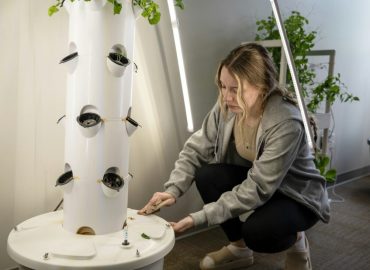From Marines to Horticulture

Embracing his newest mission
Tucker Bruguiere spent four years in the Marine Corps before enrolling at Virginia Tech, and the skills honed in the military now help him with research projects in controlled environment agriculture as he pursues a degree in environmental horticulture from the School of Plant and Environmental Sciences.
From Marines to Horticulture | Jimmy Robertson |
Tucker Bruguiere received an education long before he arrived at Virginia Tech.
In fact, orientation was three brutal months of exercises on the sand and in the heat of Parris Island just across the channel from the nearby town of Port Royal, his classes started at 5 a.m. every day, experiential learning consisted of participating in live training drills near enemy territories, and studying abroad meant serving a tour in a foreign land.
“I knew I wanted to go in the Marines,” Bruguiere said. “I just didn’t know what my life would look like after the Marines Corps.”
These days, life for the 24-year-old from Roseland, Virginia – an hour south of Charlottesville – is a little calmer and looks a lot like that of the traditional student. Bruguiere goes to class, works toward a degree in environmental horticulture from the College of Agriculture and Life Sciences, and is involved in several undergraduate research projects, specifically those that grow peppers, lettuce, tomatoes, and other leafy greens in controlled environment agriculture.
But he certainly has not marched along the traditional path. Bruguiere enlisted in the Marines after graduating from Nelson County High School in June 2017. That August, he went to boot camp at Parris Island, South Carolina.
“My brother was in the Marines,” Bruguiere said. “He was an infantry man, and he went to Afghanistan in 2013. That was very influential on how I saw myself after high school and the service that I wanted to give my country.”
Like his brother, Bruguiere went into the infantry, and he ended up being stationed with the 2nd Battalion 3rd Marines in Kaneohe Bay, Hawaii. At 19, he was deployed to Okinawa, Japan.
Bruguiere earned a spot in the battalion scout sniper platoon while there and eventually was selected to go to scout sniper school at Quantico in Northern Virginia. His success there – he became a section leader – led him back to Japan, where his unit performed training exercises with the Japanese in Hokkaido, Japan’s northernmost island that sits roughly 30 miles from the Russian island of Sakhalin.
After four years, Brugiere decided to transition out of the Marine Corps. He applied to Virginia Tech, and while working with his platoon in the California desert, he received an email from the school notifying him of his acceptance.
“Once I saw the direction that my Marine Corps career was taking, I decided, even though I had a successful Marines Corps career and enjoyed being in the Marines, the time away from home and a lull in Marine Corps activities as well as the coronavirus made me rethink my decision,” Bruguiere said. “That’s when I decided that I would get out and go to college.”
He decided to pursue environmental horticulture partly because of his rural background. Bruguiere’s family owns Dickie Brothers Orchard, a 200-acre plot in Nelson County filled with apple trees and raspberry and blackberry bushes. The farm has been in the family since 1752 spanning eight generations.
Not long after arriving at Virginia Tech, Bruguiere became involved several research projects in controlled environment agriculture – typically indoor farming away from disease and pests and in ideal growing conditions. He helps to facilitate the growth of the plants and to collect the data.
The data consists of monitoring the size, flowering time, quality, and quantity mostly of a genetic cross of plants, such as micro peppers, micro tomatoes, and other vegetables, to determine the viability of a hydroponic system in a greenhouse space or in a vertical farm. A hydroponic system grows plants by using a water-based nutrient solution rather than soil. In this case, students start the plants by seed and then transplant them to small chambers in the hydroponic system that holds them upright.
Bruguiere often assembles the system, a nutrient film technique in which the system continuously pumps the solution from a reservoir through PVC piping and to the roots of the plant. He spends anywhere from an hour to four hours daily at one of Virginia Tech’s greenhouses that serves as the hub for several projects.
“Tucker is very prompt and precise,” Michael Evans, the director of the School of Plant and Environment Sciences, said. “He’s detail oriented, has great observational skills, and great problem-solving skills. When you give him things to handle and you go over it once, you feel very, very comfortable that you can leave it in his hands. He gets it. He can execute it according to instructions, and if something unexpected pops up, he has good observational skills. He will see those things, and he will reach out.
“Sometimes feel like I might neglect him because you get him going on something, and you just have a real high comfort level that he knows what he’s doing. You can trust him to carry it out. If there’s anything that goes awry, you can trust he’ll catch it and he’ll either fix it or he’ll contact you. Those skills are exceptionally valuable.”

Bruguiere’s work led to him receiving an invitation to an event at the Institute of Advanced Learning and Research, a large complex in Danville that serves as the home for research projects in several disciplines including controlled environment agriculture. While there, he met Virginia Gov. Glenn Youngkin, who gave him a challenge coin.
“He asked me, ‘What do you do?’” Bruguiere said. “I told him that I was a military veteran and I worked for Dr. Evans at Virginia Tech. He thanked me for my service, shook my hand, and palmed me a challenge coin, which is the size of a half dollar. It had the governor’s seal and a verse from Psalms on it.”
Bruguiere plans to graduate next spring and then work in the agriculture industry, preferably for a company that practices controlled environment agriculture. He loves working in the greenhouse and someday wants to start his own greenhouse. As he said, “It’s becoming less of a job and more of a passion at this point.”
“There are a lot of jobs in controlled environment agriculture, and with his degree in horticulture, and with all of his background, and now all of his experience actually running research, doing these types of things, developing all those skills that an employer would prize, he would have a lot of opportunities,” Evans said. “We have a lot of CEA [controlled environment agriculture] companies that are growing and moving into Virginia, so the demand for that talent is pretty high – and not just in Virginia, but around the country and around the world.”
Bruguiere’s short-term plans, though, consist of going to classes, helping with research projects, and hanging with classmates – most of whom don’t know about his military service. While he takes pride in having served his country, he only brings up that part of his life when asked.
Bruguiere’s home base is Blacksburg now. His basic training consists of taking classes, testing solution pH levels, and scouting for pests.
These days, he just wants to be seen as a regular student with big goals and bigger dreams.
“I prefer to be seen as a normal person,” Bruguiere said. “I don’t make it a point to talk about my military service unless someone directly asks, and I’m never rude about it. I just don’t see myself as any different than anyone else.”
Original Article: https://news.vt.edu/articles/2023/06/CM-Bruguiere-Marines-CALS-2023.html
The post From Marines to Horticulture appeared first on GROZINE.


